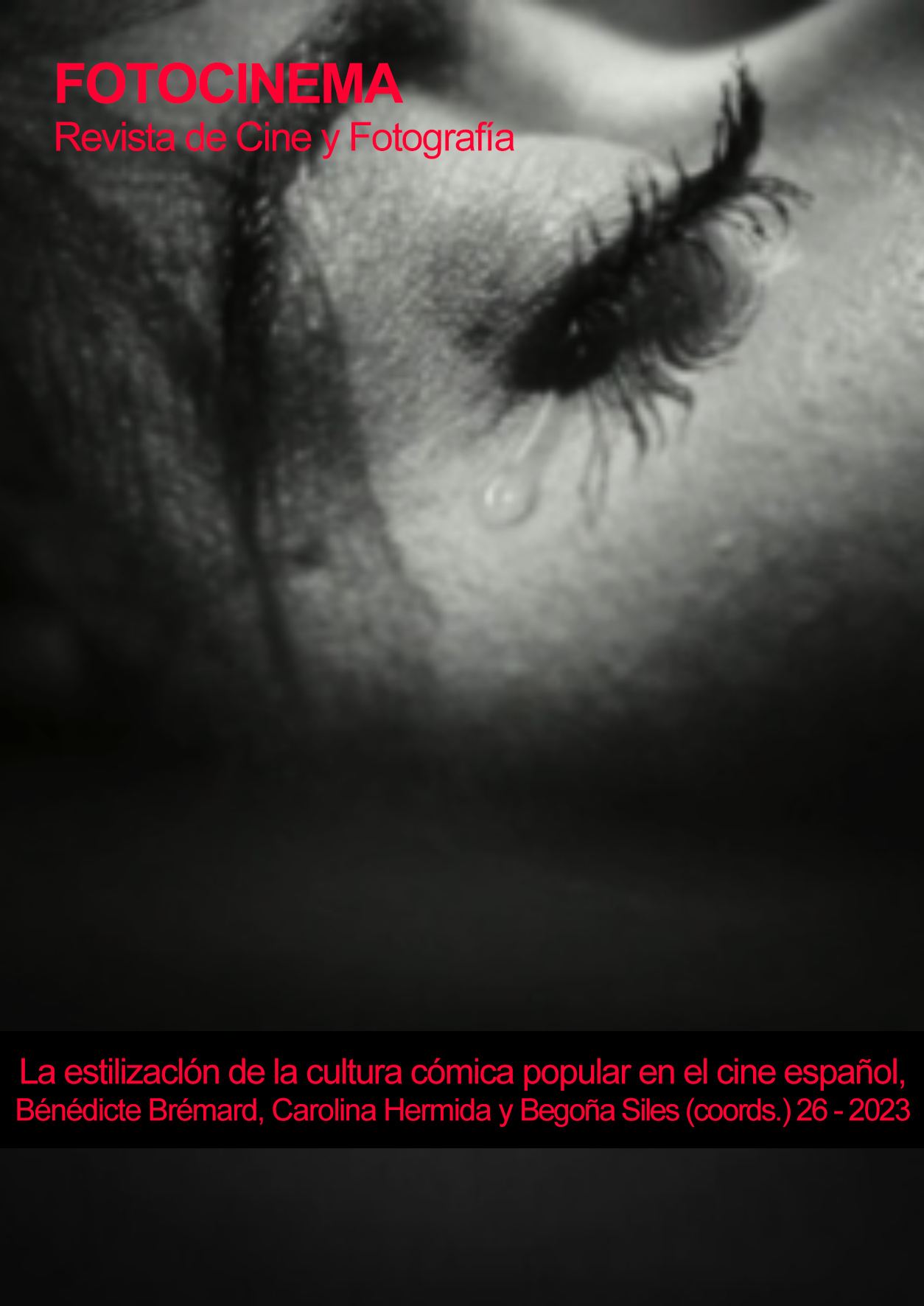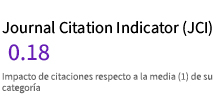Postransition, humour and self-fiction in Hombres G’s musical cinema
A look at film (de)politicization
DOI:
https://doi.org/10.24310/Fotocinema.2023.vi26.15423Keywords:
Hombres G, postransition, Spanish cinema, cinema of the eighties, satire, parodyAbstract
The two films starring the musical group Hombres G in the eighties were very little recognized by critics at the time. These fictions were caught between the works associated with the movida and a cinema made under the auspices of the subsidy system of the time, which has occupied much space in the imaginary of critics and academics. But the films of the Hombres G ¡Sufre, mamón! (Manuel Summers, 1987) y Suéltate el pelo (Manuel Summers, 1988) were an undisputed public success. The purpose of the article is to analyze how these two tapes built, through thick humour and the use of parody, satire, intertextuality and even self-mutilation, a deformed portrait of the time, which in no way can be branded as depoliticized. We will study how these two films exceeded their role as commercial vehicles at the service of a musical group to end up offering irreverent entertainment that mocked both their elders and the institutions controlled by them, as well as their contemporaries, young people completely invested in a consumer culture that greatly marked that time.
Downloads
Metrics
Publication Facts
Reviewer profiles N/A
Author statements
Indexed in
-
—
- Academic society
- N/A
- Publisher
- Universidad de Málaga
References
Fernández Santos, A. (1987). “Mamonada”, El País, 17 de junio.
Cañas, G. (1986). “Manuel Summers rueda una película sobre Hombres G”, El País, 24 de noviembre.
Casas, A. (2012). “El simulacro del yo: la autoficción en la narrativa actual”, en Casas, A. (comp.). La autoficción. Reflexiones teóricas. Madrid: Arco Libros, pp. 9-44.
Faulkner, S. (2017). Una historia del cine español. Cine y sociedad, 1910-2010. Madrid: Vervuert/Iberoamericana. Edición original (2013).
Fernández de Alba, F. (2021). Antes de ser modernos. Sexo, drogas y moda en el Madrid de los setenta. Madrid: Altamarea. Edición original (2020).
Ferrán, O. y Hilbink, L. (2018). Legacies of Violence in Contemporary Spain. Exhuming the Past, Understanding the Present. New York: Routledge.
García de Dueñas, Jesús (1969). “Un consumo erótico racionado”, revista Triunfo nº380, pp. 10-11.
Gómez, I. (2018). “Cine 1900-1980”. En López-Pellisa, T. Historia de la ciencia ficción en la cultura española. Madrid: Vervuert/Iberoamericana, pp. 279-300.
Gubern, R. y otros (2015). Historia del cine español. Madrid: Cátedra. Edición original (1995).
Haro Ibars, E. (1986). El polvo azul, cuentos del nuevo mundo eléctrico. Madrid: Libertarias.
Julian Smith, P. (1996). Vision Machines: Cinema, Literature and Sexuality. London: Verso.
Labrador Méndez, E. (2016). “Poets of the Dead Society. The Cultural History of the Francoist Mass Graves in the Poetical Archive before Democracy”, en Ferrán, O. y Hilbink, L. (2018). Legacies of Violence in Contemporary Spain. Exhuming the Past, Understanding the Present. New York: Routledge, pp.223-246.
Labrador Méndez, E. (2017). Culpables por la literatura. Imaginación política y contracultura en la transición española (1968-1986). Madrid: Akal.
Morán, G. (2014). El cura y los mandarines. Historia no oficial del bosque de los letrados. Cultura y política en España, 1962-1996. Madrid: Akal.
Riambau, E. (2015). “El periodo socialista” (1982-1992). En Gubern, R. y otros. Historia del cine español. Madrid: Cátedra, pp. 399-454.
Rodríguez Centeno, J.C. (2014). “El cine como referente de los grupos musicales españoles en la década de 1980”, en Historia y Comunicación Social, volumen 19, número especial de febrero, pp. 667-676.
Sánchez León, P. (2004). “Estigma y memoria de los jóvenes de la transición”, en Silva, E. y otros. La memoria de los olvidados. Un debate sobre el silencio de la represión franquista. Valladolid: Ámbito y Asociación para la Recuperación de la Memoria Histórica (ARMH), pp. 163-179.
Sánchez Noriega, J.L. (2013). “Crónica cinematográfica, metacine e intertextualidad en el cine español contemporáneo”, en Mínguez, N. (ed.). Ficción y no ficción en los discursos creativos de la cultura española. Madrid: Vervuert/Iberoamericana, pp. 129-152.
Sánchez Trigos, R. (2018). “Cine 1980-2015”. En López-Pellisa, T. Historia de la ciencia ficción en la cultura española. Madrid: Vervuert/Iberoamericana, pp. 301-326.
Shary, T. (2005). Teen Movies. American Youth on Screen. Columbia: Wallflower Press.
Valencia-García, L.D. (2020). Antiauthoritarian Youth Culture in Francoist Spain. Clashing with Fascism. London: Bloomsbury.
Vilarós, T. (2018). El mono del desencanto. Una crítica cultural de la transición española (1973-1993). Madrid: Siglo XXI. Edición original (1998).
Downloads
Published
How to Cite
Issue
Section
License
All contents published in Fotocinema Revista científica de cine y fotografía are protected under the Creative Commons Attribution-NonCommercial-ShareAlike 4.0 International (CC BY-NC-SA 4.0) license. All about this license is available in the following link: <http://creativecommons.org/licenses/by-nc-sa/4.0>
Users can copy, use, redistribute, share and exhibit publicly as long as:
- The original source and authorship of the material are cited (Journal, Publisher and URL of the work).
- It is not used for comercial purposes.
- The existence of the license and its especifications are mentioned.
There are two sets of authors’ rights: moral and property rights. Moral rights are perpetual prerogatives, unrenounceable, not-transferable, unalienable, imprescriptible and inembargable. According to authors’ rights legislation, Fotocinema. Revista científica de cine y fotografía recognizes and respects authors moral rights, as well as the ownership of property rights, which will be transferred to University of Malaga in open access. The property rights are referred to the benefits that are gained by the use or the dissemination of works. Fotocinema. Revista científica de cine y fotografía is published in an open access form and it is exclusively licenced by any means for doing or authorising distribution, dissemination, reproduction, , adaptation, translation or arrangement of works.
Authors are responsable for obtaining the necessary permission to use copyrighted images.














13.png)



